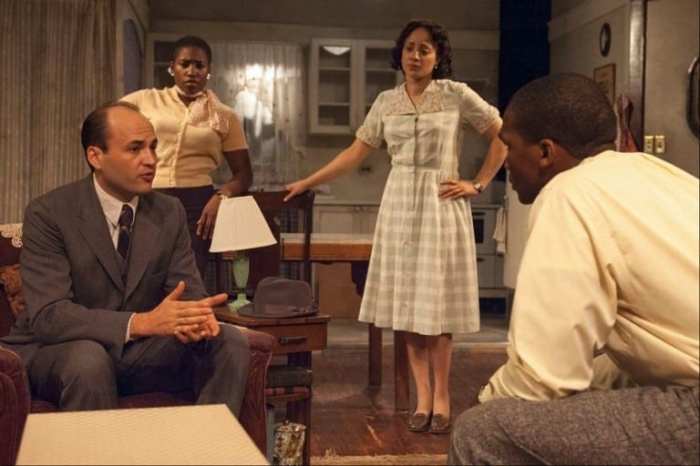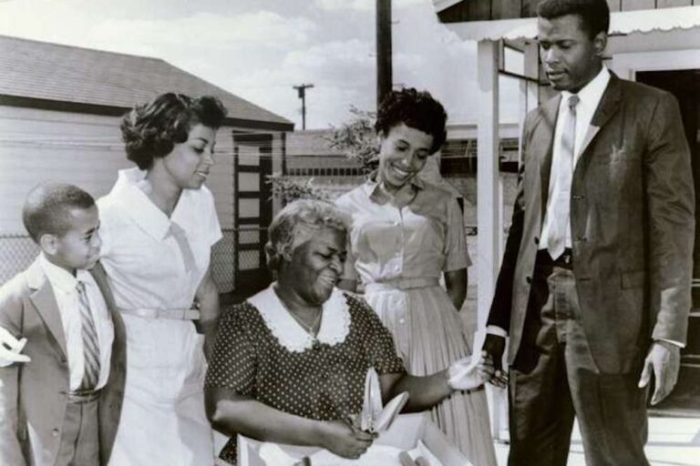Monologue from raisin in the sun – The monologue from “A Raisin in the Sun” stands as a pivotal moment in American literature, offering a profound exploration of the complexities of race, family, and the American Dream. This monologue, delivered by the character of Walter Younger, provides a glimpse into the inner struggles and aspirations of African Americans during the Civil Rights era.
Walter’s impassioned words resonate with a raw authenticity, capturing the frustrations and hopes of a marginalized community. Through the use of vivid imagery, powerful metaphors, and a compelling narrative arc, the monologue serves as a testament to the resilience and determination of the human spirit.
1. Monologue’s Background
The play “A Raisin in the Sun” by Lorraine Hansberry is a groundbreaking work in American literature, depicting the struggles and aspirations of an African American family in the 1950s. The play’s central character, Walter Lee Younger, delivers a powerful monologue that encapsulates the themes of race, family, and the American Dream.
Character and Context
Walter Lee Younger is a young man filled with dreams and frustrations. He yearns for a better life for himself and his family, but he faces the barriers of racial prejudice and economic inequality. The monologue occurs at a pivotal moment in the play, when Walter has just received a life insurance check from his late father.
He believes that this money can be used to invest in a liquor store, a venture that he hopes will bring financial success and independence.
2. Rhetorical Devices and Literary Techniques
Metaphors and Similes
Walter Lee’s monologue is rich in metaphors and similes that convey his emotional state and the challenges he faces. He compares himself to a “dried-up raisin in the sun,” emphasizing his sense of hopelessness and lack of fulfillment. He also uses the metaphor of a “check” to represent the opportunity that the insurance money presents.
Imagery
The monologue is also filled with vivid imagery that creates a sense of place and atmosphere. Walter describes the “dark and dingy” apartment where his family lives, and he envisions the “wide open spaces” of the liquor store he hopes to own.
These images contrast sharply and highlight Walter’s desire for a better life.
3. Character Development and Insight

Inner Thoughts and Emotions
The monologue serves as a window into Walter’s inner thoughts and emotions. He reveals his frustration with his current situation, his longing for success, and his determination to overcome the obstacles he faces. The monologue also exposes his insecurities and vulnerabilities, as he grapples with his own identity and the expectations of others.
Character Development
The monologue is a pivotal moment in Walter’s character development. It marks his realization that he must take control of his own life and fight for his dreams. The monologue also foreshadows the challenges that Walter will face as he pursues his goals.
4. Symbolism and Thematic Exploration
Symbols and Motifs
The monologue contains several symbols and motifs that contribute to the play’s broader themes. The “raisin in the sun” symbolizes the hopes and aspirations of African Americans, while the “check” represents the promise of the American Dream. The “apartment” represents the limitations and constraints of Walter’s current life, while the “liquor store” symbolizes his dreams of success.
Thematic Exploration
The monologue explores the themes of race, family, and the American Dream. Walter’s struggle to overcome racial prejudice and economic inequality highlights the challenges faced by African Americans in the 1950s. The monologue also examines the complex dynamics of family and the importance of pursuing one’s dreams.
5. Social and Historical Context

Civil Rights Era
The monologue is set during the Civil Rights era, a time of significant social and political change in the United States. The monologue reflects the challenges and aspirations of African Americans during this period, as they fought for equality and justice.
Contemporary Relevance
The themes explored in the monologue continue to resonate with contemporary social and political issues. The monologue highlights the ongoing struggles faced by marginalized communities and the importance of fighting for social justice.
6. Performance and Interpretation
Notable Performances, Monologue from raisin in the sun
The monologue has been performed by many notable actors, including Sidney Poitier and Denzel Washington. Each actor has brought their own unique interpretation to the character of Walter Lee Younger, capturing the emotional depth and complexity of the monologue.
Challenges and Opportunities
Performing the monologue effectively requires a deep understanding of the character and the historical context of the play. Actors must convey the emotional intensity of the monologue while also capturing the character’s vulnerability and determination.
Questions Often Asked: Monologue From Raisin In The Sun
What is the significance of the monologue in “A Raisin in the Sun”?
The monologue is a pivotal moment in the play, as it reveals the inner struggles and aspirations of Walter Younger, an African American man living in a racially segregated society.
How does the monologue contribute to the character development of Walter Younger?
The monologue provides insight into Walter’s frustrations, ambitions, and his complex relationship with his family. It allows the audience to understand his motivations and his struggle for self-determination.
What are the key themes explored in the monologue?
The monologue explores themes of race, family, and the American Dream. It highlights the challenges faced by African Americans during the Civil Rights era and their aspirations for a better life.